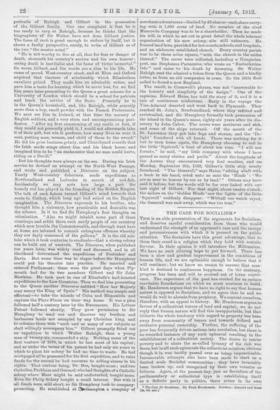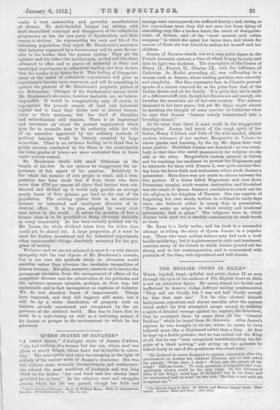THE CASE FOR SOCIALISM.*
This is an able presentation of the arguments for Socialism,. and deserves careful consideration from those who would] understand the strength of an opponent's case and the energy and persuasiveness with which it is pressed on the public. attention. The Socialists have this great advantage, that to. them their creed is a religion which they hold with ecstatic- fervour. In their opinion it will introduce the Millennium. We have no such alluring hope to put forward. There has. been a slow and gradual improvement in the conditions of human life, and we are optimistic enough to believe that it will continue ; but we know no reason to assume that man- kind is destined to continuous happiness. On the contrary,. progress has been and will be evolved out of bitter experi- ence. The experience of the past has erected for us certain inevitable foundations on which we must continue to build. Mr. Henderson argues that we have no right to say that human nature is opposed to Socialism, and we agree that he and we would do well to abstain from prophecy. We content ourselves, therefore, with an appeal to history. Mr. Henderson argues in favour of a collectivist tenure of land and capital; we do not reply that human nature will find this insupportable, but that hitherto the whole tendency with regard to property has been away from community of tenure and towards defined and exclusive personal ownership. Further, the suffering of the poor has frequently driven nations into revolution, but there ita no recorded instance of any such upheaval resulting in the establishment of a collectivist society. The desire to rescue. poverty and to abate the so-called tyranny of the rich was there, but in all such upheavals the collectivist solution, obvious, though it is, was tacitly passed over as being impracticable. Innumerable attempts also have been made to start on a limited scale Socialist communities : they have invariably been broken up, and recognized by their own votaries as failures. Again, at the present day, just as Socialism of the parliamentary or collectivist type is establishing itself as a definite party in politics, there arises in its own.
* The Case for Socialism. By Fred Henderson. London : Jerrold and Sows [2s. 6d. net.] ranks a very noteworthy and powerful manifestation -of dissent. No Anti-Socialist League has written with 'much unqualified contempt and disapproval of the collectivist ...programme as has the new party of Syndicalists, and their• reason is obvious. As representing the rank and file of the 'labouring population, they reject Mr. Henderson's assurance ' that industry organized by a bureaucracy will be more favour- :able to the worker than the present system. They see the .agitator and the talker (the intellectuals, as they call this class) :advanced to office and to places of authority in State and municipal experiments in collectivist trading, and they declare that the worker is no better for it. This feeling of disappoint-
• ment at the result of . collectivist experiments will grow as .experiments become more numerous, and will do something to .quench the glamour of Mr. Henderson's prophetic picture of the Millennium. Changes of the fundamental nature which Mr. Henderson's advocates, however desirable, are, we believe impossible. It would be comparatively easy, of course, to 'expropriate the present owners of land and industrial '•eapital and to band their duties over to elected bureau- -crate or their nominees, but the need of discipline ;end subordination still remains. There is an impersonal :and inevitable air about the present organization which goes far to reconcile men to its authority, while the rule of an executive appointed by the ordinary methods of political intrigue would be bitterly resented by large minorities. There is no evidence leading us to think that in 'public services conducted by the State or the municipality the lower grades of labour are more contented than in those 'under private control.
Mr. Henderson dwells with much bitterness on the wealth of the few. In our opinion he exaggerates the im- Tortance of this aspect of the question. Relatively to rthe whole the number of rich people is small, and a com- putation has been made that if from those who have =ore than £700 per annum all above that income were con- Ascated and divided up it would only provide an average ,yearly bonus of four guineas per head to the rest of the population. The existing system finds in an automatic :manner an interested and intelligent direction of in-
• dnstrial effort. It is the plan adopted by every civil- iized nation in the world. It solves the problem of how a (leisure class is to be provided—a thing obviously desirable tin every community. As has been recently pointed out by Mr. Ireson, the whole dividend taken from the richer class .could not be shared out. A large proportion of it must be used for further investment and for industrial experiments often unsuccessful—things absolutely necessary for the pro- grass of society.
We have—and we are not ashamed to avow it—a very sincere :sympathy with the real objects of Mr. Henderson's crusade, but in our view the methods which he advocates would .embitter rather than alleviate the inevitable inequalities of lumen fortune. His plan, moreover, seems to us to involve the permanent exclusion from the management of affairs of the .competent director and the substitution of the politician and 'the agitator—persons valuable, perhaps, in their way, but undesirable and in fact incompetent as captains of industry. We do not abandon hopes of improvement. Things have improved, and they will improve still more; but it will he by a wider distribution of property held on 'tenures already sanctioned and recognized by the ex- perience of the civilized world. Man has to learn that lie anust be a tool-owning as well as a tool-using animal if he desires to prosper in the environment to which be has :advanced.



















































 Previous page
Previous page